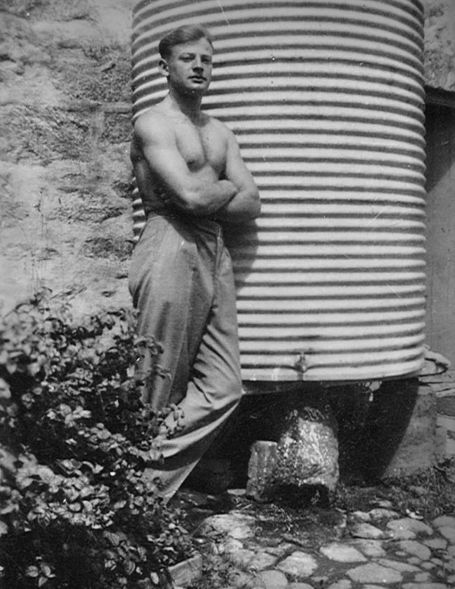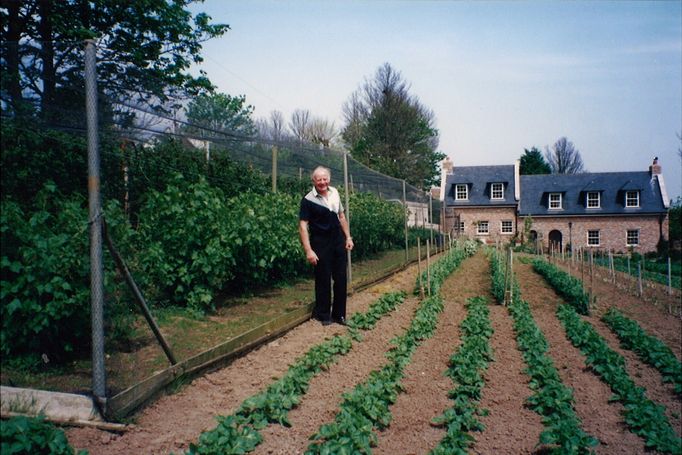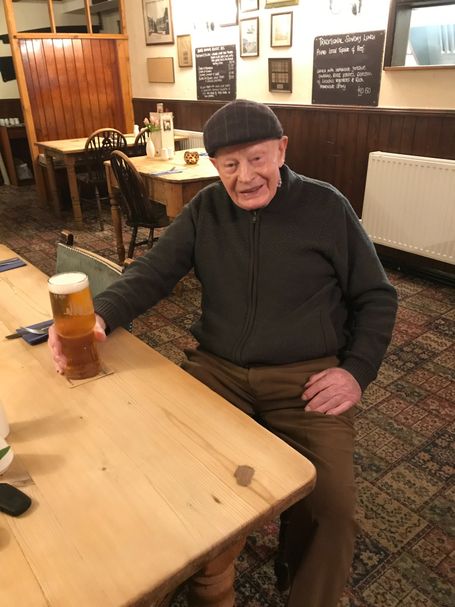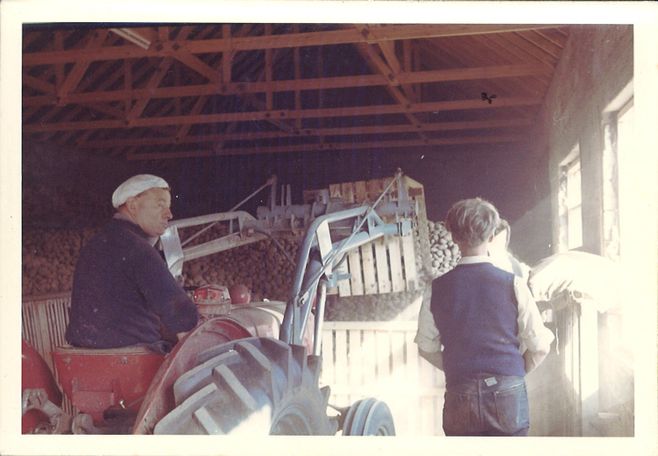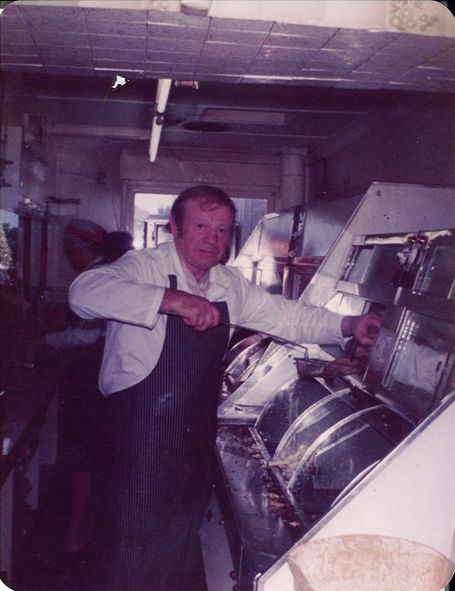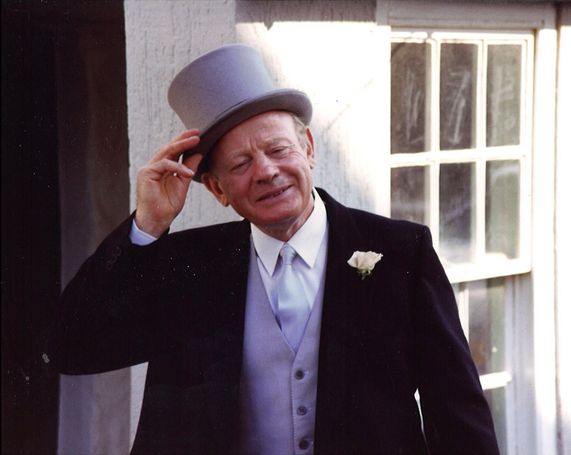Douglas Charles Le Huquet
"Steve Falla looks back on the life of this remarkable man"
He was once known as “The Potato King”, but there was much more to Dougie Le Huquet, who has died aged 99, than having a magic touch with the humble spud.
During a lifetime of impact and achievement, he applied the same work ethic, prescience and entrepreneurialism that had made his growing business such a success to other enterprises including building developments in Guernsey, Jersey and the United States.
Douglas Alfred Charles Le Huquet was born on 19 December 1921, a second son to Alfred and Elsie who had been growers in Jersey. Because the land they leased had been over-exploited and impoverished by the previous tenant the Le Huquet crops failed. Devastated and broke, they decided to start again in Guernsey a few years before Dougie was born.
Alfred joined the Royal Naval Air Service in the First World War then transferred to the Royal Air Force on its formation in 1918, leaving Elsie to farm the land they rented in St Andrew’s. She set about this with determination and drive – growing vegetables and flowers including gypsophila which she introduced to Guernsey from Jersey. After deciding to remove some trees from the land to provide more growing space, she blew them out by the roots using gunpowder.
Elsie would rise at 4.30 in the morning and could be seen walking up Donkey Hill pulling her cart which was laden with the produce she had grown to sell at the Town market. While her husband was serving in the war Elsie was able to make enough money from growing to purchase the land at La Rue Marquand that she was working. When Alfred returned from the Great War they built their house on the site and named it Newlyn after the Cornish village which was near to where Alfred had been stationed at RNAS Culdrose and which had reminded him of Guernsey.
It was in this industrious environment that Dougie was raised, running straight home through the lanes from St Andrew’s School to get down to work washing radishes in the douit or going door-to-door to sell produce for his mother. They had very little, sitting on orange boxes and drinking from jam jars, but they were a close-knit family.
Once again tragedy struck when Newlyn burnt down, uninsured, and in due course the family rented Les Huriaux Farm, St Martin’s, and eventually purchased it.
With the arrival of the the Second World War Dougie aspired to be a radio operator but the German occupation of Guernsey put paid to that. His first recollection of seeing the occupying forces was on Sausmarez Road, St Martin’s, on 30 June 1940, when he was 19 - their motorcycles, sidecars and machine guns a sobering sight for a young man.
The family remained on the island during the Occupation and Alfred died in 1942, Elsie in 1948, leaving Dougie, his elder brother Fred and his younger sister Violet to run the farm. This continued for a few years until Violet left the business, with Fred looking after the milking herd and Dougie taking care of the growing.
His lifelong entrepreneurial flair began to emerge during the Occupation. He distilled seawater to produce salt, which he bartered for dried beans to make bread, and collected seaweed from the beach with their horse and cart to put on the land – and to make blancmange. He grew, cured and cut tobacco leaves and suffered from nicotine poisoning in the process. He became accomplished at making crystal radio sets so that he and others could listen to the news. Once, during a surprise raid by the Germans, he threw the radio he had been listening to into a pan of soup that Violet was stirring on the stove.
He was careful but stood his ground with the Germans, often responding “Heil Churchill” in response to “Heil Hitler”.
Dougie would collect peelings from the German camp to feed to Alfred’s pigs. One day, a hungry forced worker asked him to smuggle one or two potatoes under the peelings which could be retrieved from the farm later. The barrels became heavier as more potatoes were hidden so that eventually Dougie stumbled under the weight, leaving peelings and potatoes on the ground at the feet of a German officer.
He and his father Alfred were summoned to appear before a high-ranking officer and were made to stand for a whole day waiting to be interrogated for allegedly stealing potatoes from the Reich. They maintained that, as they grew their own potatoes, they had no need to steal them and that they must have fallen into the barrel accidentally. Remarkably, they were set free; the alternative would have been deportation to a German work camp.
Dougie maintained that not all the Germans were bad people. On one occasion during a spot raid in which the house was searched from top to bottom, he fled out of the back door carrying the family gun and came face-to-face with a German soldier who subsequently helped him hide the weapon in a barn.
Another time he needed a mechanical part for a farm machine which he had made from a converted car. He bartered with a soldier who was a trained blacksmith and was able to make a precision part that fitted perfectly.
Adversity hit the family venture yet again due to debts incurred during the war. Property and outhouses had been purchased and the brothers had bought Violet out, but the business, now known as Le Huquet Brothers, was in the red. Dougie sold the car that he had just proudly taken ownership of and struck a deal with the bank so he could buy essential equipment from England to improve productivity, having previously picked potatoes by hand in hampers. True to form, his hard work and tenacity paid off and the bank manager came to the farm with a Churchill cigar for him on the day he finally settled the loan.
On another occasion he visited Warry’s bakery to pay a large outstanding debt, only to be told that it had been written off. He paid it anyway.
Dougie threw himself into an innovative growing regime. He forged a close relationship with the horticultural experimental station at Burnt Lane and undertook rigorous soil testing to enable him to improve his soil quality and increase his yields. He realised that after two or three crops of potatoes had been grown in the same soil it became infested with eel worm resulting in low yields, so he took steps to rectify the problem. He established a wholesale fruit and vegetable outlet to supply hotels and restaurants and sold directly to customers from the farm.
A further successful venture was to store the potatoes immediately after they had been harvested, preserving them until market demand pushed the prices up. Large wooden A frames, which he made in his workshop, were erected in the barn and pallets of potatoes were forklifted and emptied on top of them. Industrial air blowers blew air, and a powder which prevented the potatoes from sprouting and going soft, through the tunnels created by the frames. He later went on to repeat this successful process with the onions he produced.
In addition to these crops Dougie grew brassicas, tomatoes, freesias, daffodils, and gladioli.
Once he was burning off potato foliage with sulphuric acid when the wind turned and he saved himself from serious injury by diving headfirst into a cattle water trough.
Another year he had a variety of potato which he grew with the intention of selling it to local chip shops, but it didn’t make good chips. Unbeaten, he took a sample to the local crisp producer who tried the potatoes and deemed them to be ideal for crisps and so he was able to sell the whole crop.
In the era before bar meals became commonplace, chip shops were highly popular and the synergy with his potato crop did not escape Dougie who decided to cut out the middleman. Initially he leased the North Side and Cobo chip shops and subsequently bought them, all the time supplying them with his own potatoes. Dougie guarded his “secret” batter recipe fiercely. He worked various shifts in both chip shops over the years in between his business trips to Florida to oversee his building works in Cape Coral.
In 1952 Dougie married Vera Gwendoline Hodgetts, who had been born in the Assam Valley in India while her parents were working there. Platinum blonde, Vera was named ‘Bonny’ by her Indian nursemaid and continued to be known by that name throughout her life. Bonny’s parents moved back to England when she was two. She trained as a nurse in Dudley before moving to Guernsey to work at the Amherst Maternity Hospital. After their daughter, Michelle, was born she joined Dougie working on the farm often packing flowers until the early hours. Later they ran a successful guest house from the farmhouse at Les Huriaux, just up the hill from Newlyn, where Dougie and his siblings had originally lived with their parents. After they divorced he was remarried, to Jenny. They were to build a striking home, La Vallee de Vert, on the site of his parents original Rue Marquand house using pink Jersey granite from two demolished Jersey cottages.
Other building developments included condominiums with water frontage in Cape Coral, Florida, in partnership with a friend, John Troy, and Chateau du Haut, a grand house with staff quarters and a large swimming pool on land in Grouville, Jersey, which he had inherited from his uncle.
Alongside hard work, Dougie embraced integrity and he helped others out where he could. His rule of thumb was “always leave something in it for the other guy”.
On one occasion he dug up six rows of potatoes, not yet ready for picking, to allow access to farmer Freddie Best so that he could harvest hay which was about to be ruined by rain. This was rewarded later when he was offered the use of the Best fields with their virgin soil.
Dougie was not afraid to swim against the tide to gain an advantage.
When other farmers were putting up Dutch barns, he turned heads by building outbuildings at Les Huriaux Farm in blockwork and including windows, foreseeing a day when he would no longer earn his living from growing. The Les Huriaux complex later housed a garden centre and now accommodates Les Bourgs hospice shop and a mix of various businesses.
Dougie excelled at woodwork. Among other things, he steam-bent wooden hula hoops for Michelle, made her a toboggan, a go cart, and used old greenhouse timber to make an agility course on the farm for her to train her dog Sandy. He built a boat powered by an Austin A35 engine, with one of his friends Vernon Baker, in which he would motor round to Fermain and he made garden gates for Michelle and Brian’s house in Somerset and several of his Guernsey neighbours, made of wood salvaged from the wrecked MV Prosperity.
A keen driver, he enjoyed touring holidays, especially in his mark 10 Jaguar, the first to be imported to Guernsey. When his driving licence was renewed at the age of 99, he proudly told friends that the doctor had said “see you when you are 101”. He drove to pick Michelle up from the airport two days before he was taken ill and rushed into hospital.
Dougie was blessed with good health and a sharp mind right to the very end, he belied his age and had already had a hand in organising his 100th birthday party which he missed by three days. Invites had gone out to friends and family and a Marilyn Monroe lookalike had been booked to make a surprise appearance.
Michelle said: “I thought Dad would go on forever. He was tough, strong and determined, and he always pushed himself to be the very best that he could be.”
An often hard, and undoubtedly eventful, long life will leave a legacy. Dougie and Michelle had planned some time ago for his commercial properties, including Les Huriaux Farm Complex and flats, the Cobo Chip Shop and the Cobo Village Stores, to be held in a Trust and this will benefit local charities for many years to come.

